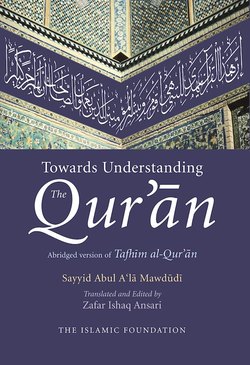Читать книгу Towards Understanding the Qur'an - Sayyid Abul A'la Mawdudi - Страница 45
На сайте Литреса книга снята с продажи.
ОглавлениеTowards Understanding the Qur’an
abstraction were possible it would remain confined to the scraps of paper on which it was written and would fail totally to have any impact on human life.
Moreover, if one wishes to spread any intellectual, moral and cultural movement on an international scale, it is by no means essential, in fact it is not even useful, for it to start on a global scale. If one wishes to propagate certain ideas, concepts and principles as the right bases for human life, one should begin by propagating them vigorously in the country where the message originates, and to the people whose language, temperament, customs and habits are familiar to its proponents. It will thus be possible to transform the lives of the people into a practical model of the message. Only then will it be able to attract the attention of other nations, and intelligent people living elsewhere will also try to understand it and to spread it in their own lands.
Indeed, what marks out a time-bound from an eternal, and a particularistic national doctrine from a universal one, is the fact that the former either seeks to exalt a people or claims special privileges for it or else comprises ideas and principles so vitally related to that people’s life and traditions as to render it totally inapplicable to the conditions of other peoples. A universal doctrine, on the other hand, is willing to accord equal rights and status to all, and its principles have an international character in that they are equally applicable to other nations. Likewise, the validity of those doctrines which seek to come to grips merely with questions of a transient and superficial nature is time-bound. If one studies the Qur’an with these considerations in mind, can one really conclude that it has only a particularistic national character, and that its validity is therefore time-bound?
[ IX ]
Those who embark upon a study of the Qur’an often proceed with the assumption that this Book is, as it is commonly believed to be, a detailed code of guidance. However, when they actually read it, they fail to find detailed regulations regarding social, political and economic matters. In fact, they notice that the Qur’an
xliv
